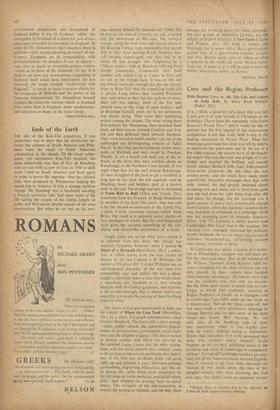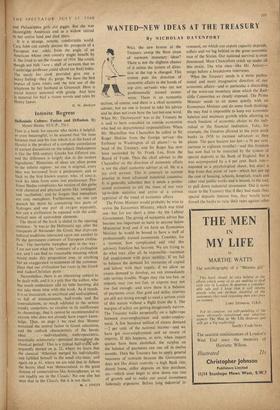Cara and the Regius Professor
With Dearest Love to All: The Lite and Letters of Lady Jebb. By Mary Reed Bobbitt. (Faber, 25s.)
IT is, I think, a good test of a book that you buy it and give it to your ft lends at Christmas or on birthdays. I have done this repeatedly with Gwen Raverat's Period Piece* and it would be idle to pretend that the first interest of this entertaining compilation is not that Lady Jenb is one of the leading characters in Period Piece. What her American great-niece has done is to tell by letters, to and from her great-aunt, and by the use of a few other sources, the success story of the beauti- ful widow who was the toast and delight of Cam- bridge and married the brilliant and moody Greek scholar, Richard Jebb. Lady Jebb counted thirty-seven proposals, the last when she was seventy-seven, and she could have made more superficially attractive marriages than that with Jebb. Indeed, she had greatly hesitated about accepting him and seems not to have been quite sure she had done the right thing even after she had taken the plunge; but the marriage was a great success. It was a very considerable change from Laramie, where het husband, General Sim- mer, had been in command, to Cambridge which was just emerging from its monastic slumbers. (Now, with TV, Laramie is better known than Cambridge.) But 'Cara' rose to the occasion. She watched over, managed, reformed her brilliant, moody husband. He was in many ways a typical Irishman; hypochondriac, self-pitying, careless over money, too fond of drink. .
If Cambridge was unlike Laramie or Charles- ton or Philadelphia, Glasgow was still more un- like her American base,. But, at the insistence of Sir William Thomson (Lord Kelvin), Jebb be- came a candidate for th, chair of Greek and was duly elected. In those remote days Scottish chairs had two advantages: the salaries were high and the academic year was only. six months. But the Jebhs spent nearly as much time in Cam- bridge, to which Jebb eventually returned, as Regius Professor of Greek, as in Glasgow, and in Cambridge Cara Jebb could ply her trade as a matchmaker. Not all her plans came off, but one niece made a most satisfactory marriage to George Darwin and we have news of the baby Gwen--the future Mrs. Raverat. We are told, also, of the headlong rush of dons into matrimony when it was legally pos- sible to marry without losing a fellowship. Before that liberation, is it to be presumed that dons who couldn't marry burned? Leslie Stephen, so we are told, attributed much of the boredom and waste of Cambridge to compulsory celibacy. Yet not all Cambridge maidens got mar- ried; not all the American nieces married English- men or married at all. Cara Jebb obviously re- mained of two mind.; about the men of her adopted country; they were charming, they had nice legs; they didn't insist on perpetual chatter • Period Piece is shortly due to he reissued by Faber in their paper-covered editions. and Philadelphia girls did giggle. But she was incorrigibly American and as a widow retired to her native land and died there.
It is a strange, remote, comfortable world. Cara Jebb can calmly discuss the prospects of a European war. ,olely from the angle of an American whose own country might benefit by it. She lived to see the disaster of 1914 She could, though not rich. !Ave s, staff of servants that no Cambridge professor, could afford (or find) today. The meals her cook provided give one a heavy feeling--they dim gorge. We have the first impact of lawn tcnnk and the first use of the telephone by her husband at Greenock. Here is social history seasoned with gossip. And here is material for half a dozen novels and tales by Henry James
D. W. BROGAN







































 Previous page
Previous page